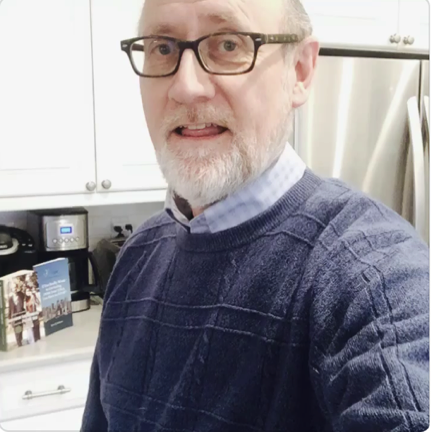THE BRAIN IS A COMPULSIVE BEAN COUNTER
I broke my wife’s small round hand mirror the other day.
It was on the bathroom vanity counter and a hand towel was covering it and I pulled the hand towel to use it and the mirror fell onto the hard tile floor.
“Shit! Now what do I do?”
That was the thought in my head, but with Mindful Pathfinding, I don’t identify with that thought.
I attribute the negative emotion and negative thoughts to my brain, the source of the Inner Voice in my head. And I named my Inner Voice, ‘Milo.’
Which I know may sound a little weird but it’s actually a very powerful psychological technique, called ‘distanced self-talk.’
Milo is upset because the accident disturbs my picture of myself:
“Everything flows for me.”
“I'm very coordinated.”
“I'm aware of my surroundings.”
These are descriptions that I have come to believe should be true about me. I give them value.
So when something happens to suggest that they aren’t quite as accurate as I’d like to believe, Milo sees my ‘sense of self’ being threatened and scrambles for a path to some sort of fulfilling outcome.
But in imagining a threat he closes down the very source of inner guidance from my non-conscious mind, my ‘Pathfinder,’ that would give him that path.
The purpose of Mindfulness Pathfinding is to answer the question: “What do I do now?” by coaching the brain to look to our better-informed GPS-like Pathfinder for our path that maximizes fulfillment here.
But Milo has the bit in his mouth and is racing ahead to do damage control to my sense of self about “The Incident of the Hand Mirror.”
“Well, it wasn’t really your fault. The mirror shouldn’t have been there!”
Which makes Milo feel a little better. Someone else put the mirror where it should not be. And no one could have expected a mirror to be under the towel.
Milo, my brain, is a bean counter.
He is constantly calculating whether a thing will add to my sense of self, or subtract from it and what can he do to mitigate loss or maximize gain.
My Pathfinder’s primary drive is to provide my brain with a path to fulfilling outcomes so that I thrive.
My brain’s primary drive is to make sure any path I take ensures I survive.
And while of course that includes physical survival, it often places a higher value on psychological (sense of self) survival.
Milo quickly imagined another threat: “Jeanne is going to be pissed at me!”
That’s going to cost some points!
She’ll no doubt clarify for me that I am clumsy, or unaware, or worse! And she’ll have the proof...the broken mirror, her broken mirror!
Milo though, can be devious:
“So don’t mention it to her. When she finds the broken mirror, she might think she did it!”
No point loss!
(Is it me, or is this beginning to sound like an episode of Everybody Loves Raymond?)
Then, in the pause that occurs when Milo can’t think of what to do, he opens a space that reconnects him to the guidance of my Pathfinder.
“No, it wouldn’t be right to let her think that. Better come clean and tell her.”
Even that ‘path’ is analyzed by Milo. He calculates that the cost to my sense of self, of being deceptive, is greater than the cost of owning up to the accident.
And he calculates that owning up to the accident might even gain me points because I am ‘being honest.’
Then he sees another threat. (Milo is relentless!)
I have an appointment and one description of myself that I value is that I’m a person who is always on time.
If I mention the mirror to Jeanne before we leave the house there might be a situation which would delay our leaving and make me late.
Don’t want to lose points.
So I wait.
And once we are in the car I tell Jeanne that I have accidentally broken her small hand mirror.
She is pissed.
For about two seconds.
Then she casually mentions that she can just pick another one up at the store.
And she lets the subject drop.
Milo does a victory dance in my head! “Yes! No point loss!”
One of the world's leading neuroscientists Dr. Lisa Feldman Barrett wrote in her 2020 book Seven and A Half Lessons About the Brain:
“Your brain continually invests your energy in the hopes of earning a good return, such as food, shelter, affection, or physical protection.”
Barrett says the brain’s purpose is not so much to think as it is to survive.
Part of survival is sustaining your physical energy. Your psychological state is directly connected to your energy levels.
That is why your Inner Voice, the brain, is constantly seeking opportunities to increase or sustain your sense of self, and to protect you from imagined threats to it.
Many times, because of the way your Inner Voice got wired, it needlessly worries about threats that do not exist, or that will never materialize.
This, ironically, reduces your energy by stressing you out.
And it also blocks the very guidance that can provide you your best path forward to a fulfilling outcome no matter where you are, or what has happened.
The thing about Milo being a bean counter is that I understand he is really searching for an answer to, “What should I do here?”
And the exact protocol I use when I notice this depends upon whether I’m sitting down relaxing, or in the middle of the situation like this.
But it’s always a variation on using S.T.O.P. and then looking to see what comes up when I ask:
“Where is our most fulfilling path forward here?”
I don’t Milo to try to figure it out. I just want Milo to pause and clear a space to mindfully notice what inner resources Pathfinder makes available to him when he is connected to that source.
This way he will learn a more satisfying way to respond to any imagined threat (and I will experience much less stress!).
How can you help reconnect your Inner Voice to your Pathfinder’s guidance?
The basic technique is on the HOW DO I DO IT? page. Once you try that you’ll have all sorts of questions about using it for specific challenges in your real life.
That’s why you’ll benefit from joining me in The Pathfinder’s Conversation.
Look, there are plenty of options for you on the Internet. There is an endless supply of courses, and progams, and content on the internet.
But that content is not optimized for your personality and your personal needs.
At The Pathfinder’s Conversation, the focus is on your life, your challenges, you personality.
It’s all about taking a powerful process and optimizing it to work best for you, in your liife.
Come to a place where you can talk to a real person using Mindful Pathfinding to engage the real challenges of everyday life.
Because real learning is arises from the combination of what happens when you try something out in your real life, and what you learn when you share experiences with another on the same path.
Only $8/month
Start anytime Stop anytime



The New American Mindfulness
MINDFUL
PATHFINDING
INSIGHTS
